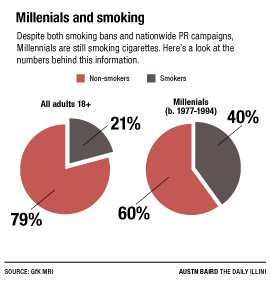Statewide smoking ban for public universities and community colleges passes Illinois House

April 15, 2014
The Illinois House of Representatives voted 67-44 on April 2 to pass the Smoke-Free Campus Act, a bill that would ban smoking at all public universities and community colleges across the state. While the Urbana campus of the University of Illinois and 13 other Illinois colleges already follow this policy, the bill requires all other universities and community colleges to craft their own enforcement policies.
The bill, SB 2202, is currently awaiting a vote in the Senate, where it has support and opposition from both sides of the political spectrum. The bill does not lay out any specific policies regarding enforcement, leaving it up to the individual universities and community colleges to decide what penalties will be in place.
The University has had a smoking ban in place since January 1. Despite some criticism from the campus community, director of the University Wellness Center Michele Guerra believes the University’s smoking ban has been a success.
“Most of the campuses that we talked to that went through a similar process to us … reported to us that they had very high, upwards of 90 percent, compliance rates,” Guerra said. “I would say that’s where we’re at. We followed a similar procedure, and I’d say our compliance rates are very high.”
Guerra estimates that since the University’s ban went into effect, there have been only one or two dozen noncompliance citations handed out. Instead of issuing citations, Guerra said she believes the key to a successful smoking ban is effectively educating the student body of the dangers associated with smoking.
Get The Daily Illini in your inbox!
“Right now, the policy is new,” Guerra said. “We are primarily using a combination of informational approaches, such as signage … and through other informational approaches, such as our newly formed team of smoke-free ambassadors. I think it’s going well because the communication (is) there.”
While an information campaign may be what the University deems to be the best way of reducing the amount of college-age smokers, studies indicate that young people are aware of the potential risks associated with smoking but are not dissuaded from it.
A recent study, conducted by GfK MRI, a consumer research agency, found that 21 percent of U.S. adults are smokers and that 40 percent of smokers are Millennials, defined as being born between 1977 and 1994. Within the last 12 months, 44 percent of Millennial smokers claimed to use e-cigarettes, which are largely unregulated by the U.S. Food and Drug Administration and included in the proposed ban.
During the passage of the University’s smoking ban, Illinois student senators Rachel Heller and Kevin Seymour voiced opposition to certain aspects of the policy, specifically regarding enforcement policies.
As it currently stands, if students are reported or caught violating the University smoking ban, they risk being referred to the Office for Student Conflict Resolution, or their resident adviser if they are living in University housing, Guerra said. If violated by University faculty or staff, they can be referred to either human resources or their supervisor, depending on their position.
“I don’t oppose the smoking ban, I just oppose the University formally reprimanding students who don’t abide by the smoking ban,” Heller, junior in LAS, said. “Students can be reprimanded up to expulsion from the University if they have several offences of the smoking ban, and I don’t agree with that.”
Heller stated that she believes many students feel conflicted about smoking bans going into effect.
“I think a lot of students are on the fence about whether or not they support it because if someone doesn’t smoke and doesn’t like to be around the smoke from cigarettes, yes it benefits them,” Heller said. “But, if they are fundamentally against restricting somebody’s constitutional right, then obviously that would be (a) conflicting feeling.”
Seymour, a graduate student in Engineering, said he believes enforcing a smoking ban is a waste of the University Police Department’s resources.
“From the start, I knew it was an unenforceable policy,” Seymour said. “I think that police officers have better things to do with their lives then go around busting people for smoking.”
Despite the criticisms of the University’s ban, when asked if a statewide ban on smoking on the campuses of public universities and community colleges could be successfully implemented, Guerra answered in the affirmative but stated that communication and information are crucial to its success.
“I think it can be,” Guerra said. “I think it remains to be seen what the communication level will be between the state and the University. Clearly there are some people who are still smoking, but those numbers don’t seem to be particularly high, and we are working on gaining compliance in the areas where there is not compliance now.”
Joshua can be reached at [email protected].






